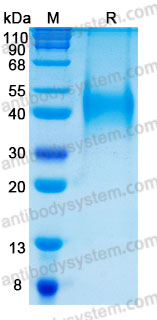Catalog No.
AHC22301
Biological activity
Measured by its ability to cleave a flourogenic peptide substrate Pro-Phe-Arg-7-amido-4-methylcoumarin (PFR-AMC). The specific activity is >1,500 pmol/min/µg, as measured under the described conditions.
Expression system
Mammalian Cells
Species
Homo sapiens (Human)
Protein length
Ile25-Ser262
Nature
Recombinant
Endotoxin level
<0.1 EU/μg of the protein by the LAL method.
Purity
>90% as determined by SDS-PAGE.
Accession
P06870
Applications
Bioactivity, ELISA, Immunogen, SDS-PAGE, WB
Form
Lyophilized
Storage buffer
Lyophilized from a solution in PBS pH 7.4, 5% Trehalose, 5% Mannitol.
Reconstitution
Reconstitute in sterile water for a stock solution. A copy of datasheet will be provided with the products, please refer to it for details.
Shipping
In general, proteins are provided as lyophilized powder/frozen liquid. They are shipped out with dry ice/blue ice unless customers require otherwise.
Stability and Storage
Use a manual defrost freezer and avoid repeated freeze thaw cycles. Store at 2 to 8°C for one week. Store at -20 to -80°C for twelve months from the date of receipt.
Alternative Names
Kallikrein-1, Kidney/pancreas/salivary gland kallikrein, Tissue kallikrein, KLK1
Integrative genomic pan-cancer analysis reveals the prognostic significance of DEFB1 in tumors., PMID:40244529
A Phase 1C, Open Label, Single Ascending Dose Study to Evaluate the Safety, Tolerability, and Pharmacokinetics of DM199 Administered Intravenously with a Polyvinyl Chloride Bag in Adult Healthy Subjects and Adults Recently Taking Angiotensin-Converting Enzyme Inhibitors., PMID:40237565
Integrative multi-omics analysis of autism spectrum disorder reveals unique microbial macromolecules interactions., PMID:39870302
Tissue Kallikrein-1 Suppresses Type I Interferon Responses and Reduces Depressive-Like Behavior in the MRL/lpr Lupus-Prone Mouse Model., PMID:39337564
An integrated bioinformatic investigation of kallikrein gene family members in kidney renel cell carcinoma., PMID:39116105
Application of Proteomics and Machine Learning Methods to Study the Pathogenesis of Diabetic Nephropathy and Screen Urinary Biomarkers., PMID:38949094
Dysregulation of kidney proteases in the pathogenesis of hypertension following unilateral nephrectomy in juvenile mice., PMID:38463588
KLK7, KLK10, and KLK11 in Papillary Thyroid Cancer: Bioinformatic Analysis and Experimental Validation., PMID:38316654
Integrative analysis of transcriptome and proteome in primary Sjögren syndrome., PMID:38128705
[Relationship of the kallistatin gene expression with male spermatogenic dysfunction and its possible mechanism]., PMID:37846113
Altered renin-angiotensin system gene expression in airways of antigen-challenged mice: ACE2 downregulation and unexpected increase in angiotensin 1-7., PMID:37595771
A regulatory mechanism of mouse kallikrein 1 gene expression by estrogen., PMID:37580010
Defining the clinical validity of genes reported to cause pulmonary arterial hypertension., PMID:37422716
The relationship between clinical phenotype and kallikrein-kinin bioregulation in different forms of arthritis., PMID:37202736
Analysis of IGHA1 and other salivary proteins post half marathon in female participants., PMID:37193030
Kallikrein-Related Peptidase 12 (KLK12) in Breast Cancer as a Favorable Prognostic Marker., PMID:37176127
Identification of key genes, biological functions, and pathways of empagliflozin by network pharmacology and its significance in the treatment of type 2 diabetes mellitus., PMID:36819540
saKLK1-374 is more difficult to induce KLK1 expression in normal prostate cell lines than that in prostate cancer cell lines: Rethinking the universality of RNA activation., PMID:36610381
Behavior of the renal kallikrein in spontaneously hypertensive rats: Influence of sexual hormones and aldosterone-sensitive distal nephron ion channels., PMID:36549423
Stroke: Molecular mechanisms and therapies: Update on recent developments., PMID:36460240
The therapeutic relevance of the Kallikrein-Kinin axis in SARS-cov-2-induced vascular pathology., PMID:35930434
Searching for Genetic Biomarkers for Hereditary Angioedema Due to C1-Inhibitor Deficiency (C1-INH-HAE)., PMID:35873600
Analysis of the association of ANO3/MUC15, COL4A4, RRBP1, and KLK1 polymorphisms with COPD susceptibility in the Kashi population., PMID:35513865
Novel insight into pancreatic adenocarcinoma pathogenesis using liquid association analysis., PMID:35180880
Tissue Kallikrein Protects Rat Prostate against the Inflammatory Damage in a Chronic Autoimmune Prostatitis Model via Restoring Endothelial Function in a Bradykinin Receptor B2-Dependent Way., PMID:35154561
Renal-on-Chip Microfluidic Platform with a Force-Sensitive Resistor (ROC-FS) for Molecular Pathogenesis Analysis of Hydronephrosis., PMID:34951537
Siglec-H-Deficient Mice Show Enhanced Type I IFN Responses, but Do Not Develop Autoimmunity After Influenza or LCMV Infections., PMID:34497606
Integrative genomic analysis of blood pressure and related phenotypes in rats., PMID:34010951
Identification of First-in-Class Inhibitors of Kallikrein-Related Peptidase 6 That Promote Oligodendrocyte Differentiation., PMID:33949859
Identification of potential salivary biomarker panels for oral squamous cell carcinoma., PMID:33564003
Helicobacter pylori, clinical, laboratory, and noninvasive biomarkers suggestive of gastric damage in healthy school-aged children: A case-control study., PMID:33278617
Acteoside as a potential therapeutic option for primary hepatocellular carcinoma: a preclinical study., PMID:32993568
Heparin Blocks the Inhibition of Tissue Kallikrein 1 by Kallistatin through Electrostatic Repulsion., PMID:32481593
Gene Expression of Kallikreins in Breast Cancer Cell Lines., PMID:32366393
Kinin B1 Receptor Signaling in Skin Homeostasis and Wound Healing., PMID:32226346
Clinically Actionable Insights into Initial and Matched Recurrent Glioblastomas to Inform Novel Treatment Approaches., PMID:32082376
Associations of ACE I/D polymorphism with the levels of ACE, kallikrein, angiotensin II and interleukin-6 in STEMI patients., PMID:31873176
Novel risk genes and mechanisms implicated by exome sequencing of 2572 individuals with pulmonary arterial hypertension., PMID:31727138
Design and development of a series of borocycles as selective, covalent kallikrein 5 inhibitors., PMID:31521475
Kallikrein-Related Peptidase mRNA Expression in Adenoid Cystic Carcinoma of Salivary Glands: A Polymerase Chain Reaction Study., PMID:31515705
Association of imputed prostate cancer transcriptome with disease risk reveals novel mechanisms., PMID:31308362
Proteomic identification of elevated saliva kallikrein levels in the mdx-4cv mouse model of Duchenne muscular dystrophy., PMID:31193643
Increased fibrinolysis-induced bradykinin formation in hereditary angioedema confirmed using stored plasma and biotechnological inhibitors., PMID:31133046
Structure guided drug design to develop kallikrein 5 inhibitors to treat Netherton syndrome., PMID:31005442
Tissue kallikrein regulates alveolar macrophage apoptosis early in influenza virus infection., PMID:30908937
Kallikrein 5 inhibitors identified through structure based drug design in search for a treatment for Netherton Syndrome., PMID:30691925
Biosynthesis and Secretion of Human Tissue Kallikrein in Transgenic Chlamydomonas reinhardtii., PMID:30544606
Dataset on the comparative proteomic profiling of mouse saliva and serum from wild type versus the dystrophic mdx-4cv mouse model of dystrophinopathy., PMID:30456239
Comparing Pathways of Bradykinin Formation in Whole Blood From Healthy Volunteers and Patients With Hereditary Angioedema Due to C1 Inhibitor Deficiency., PMID:30333824
Effect of Kallikrein-related Peptidase KLK1 on Ameliorating Spermatogenesis Regeneration in Busulfan-induced Azoospermic Mice and Promoting Mouse Spermatogonial Stem Cell Proliferation In Vitro., PMID:30171922


